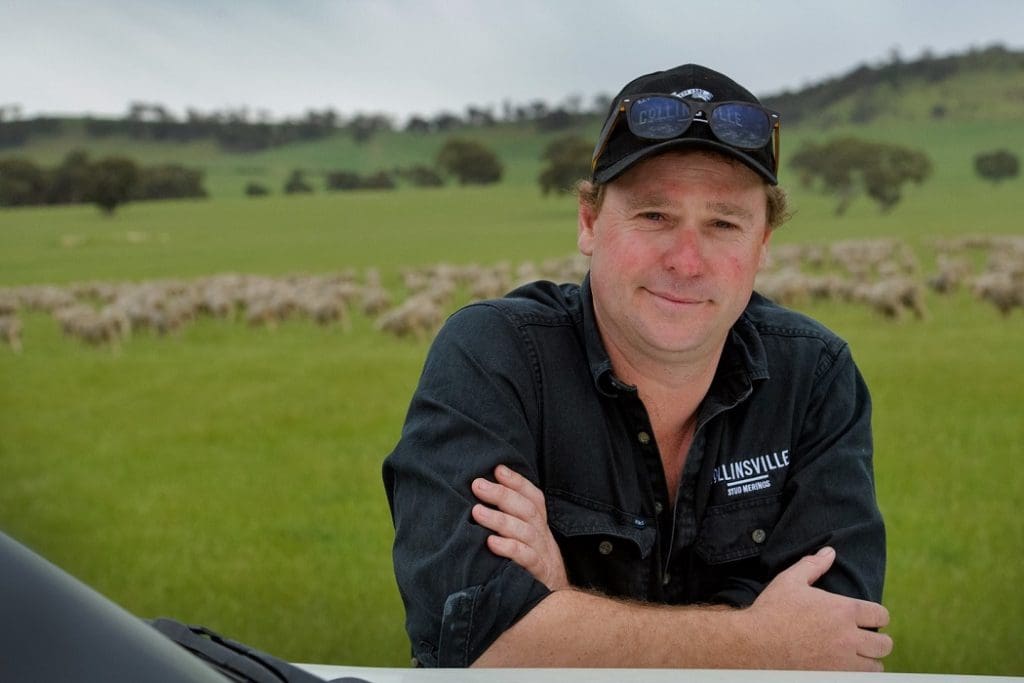
Collinsville Merino Stud principal George Millington is running for an AWI board seat.
COLLINSVILLE Merino stud principal George Millington and Western Australian grower Neil Jackson have declared their intention to run for a seat on the Australian Wool Innovation board, signalling the start of the biennial jockeying for the coveted director positions.
An AWI spokesman said Western Australian director David Webster and South Australian director James Morgan are retiring from the board this year.
No confirmed information is available on which directors will seek re-election.
“The board will finalise that by the end of August.
“Potential candidates have until the 18th of September to attain more than 99 verified signatures to then appear on the ballot,” the AWI spokesman said.
The ballot detailing candidates will be mailed and emailed to shareholders in mid-October. AWI’s annual general meeting will be held on the 17th November.
Retiring Victorian wool grower Noel Henderson told Sheep Central he had not yet decided whether he would retire from the AWI board or not. At least two other Western Australian growers are believed to be considering running for the board, but Sheep Central has been unable to confirm their intentions.
Nominating to positively influence the industry’s future
Mr Millington said he has a personal understanding of the challenges, pain points and frustrations wool growers face.
“I am nominating to join the Australian Wool Innovation board of directors to positively influence the future of the wool industry, to lift the price of wool and to ensure we have a sustainable industry for the next generation.
“Australian Wool Innovation has demonstrated the power and impact that a successful marketing campaign can have across the world with the recent ‘wear wool, not fossil fuel’ campaign and I believe there is further opportunity to establish wool as a modern fibre and continue to lift the value of the natural fibre that woolgrowers know and love,” he said.
Mr Millington said as a firm believer in the benefits of the world’s most natural and sustainable fibre, he has his sights set on representing commercial and stud wool growers across Australia to take the industry forward.
George and Sophie Millington purchased Collinsville Stud Merinos in 2014 and have followed with the purchase of East Bungaree Stud in 2020, marking the union of two of the largest volume Merino and Poll Merino breeders of Australia. They own
In a media release, Mr Millington said while fully appreciative of the past, he is driven to breed modern profitable Merinos that are still true to the type and country they suit.
The Millington’s sheep and wool enterprise runs across three properties in South Australia spanning 160,000 acres.
This had given Mr Millington has gained a deep understanding and first-hand experience of the many challenges the industry is facing, including wool harvesting, the effects of variable climate and drought, large swings in the wool market, and the challenges of running a business in rural Australia with limited workforce availability.
“I love being involved in an enterprise that produces a natural and renewable product that is wool; it is such a great fibre.
The natural, thermal and water-resistant properties make it a fibre for the modern world,” he said.
“Our business has evolved alongside our sheep.
“What was once a traditional stud is now a thriving and innovative enterprise.”
Prior to owning Collinsville and East Bungaree, Mr Millington gained a Bachelor of Economics and worked in the finance industry for several large entities until 28. He was then involved in the coffee industry where he built and expanded a wholesale coffee importation and roasting business (Monjava Coffee). After building the business substantially, it was sold to San Remo Pasta. Mr Millington then purchased a logistics company (APD Parcel Delivery) and is still involved in the management of this company today. This business has also expanded significantly under Mr Millington’s ownership, as has the Collinsville sheep business.
Mr Millington said the challenges of running and growing businesses for the last 20 years, has given him experience across multiple industries. This has ranged from the importation, production, and marketing of a branded product in the fast-moving consumer goods segment, to also experiencing the many challenges our logistics and farming businesses face. These issues range from team management and building, to having to make hard decisions about where and when to spend the next marketing dollar, as well as constantly evaluating our brands and the capital investments required, to survive and grow, he said.
“I have built a successful track record growing, running and leading businesses in a variety of industries, sustainably and profitably.
“Over the last 11 years in the wool industry, I’ve spoken to countless wool growers around the country and heard the shared challenges we all face within the industry,” he said.
Merino industry is at the crossroads – Jackson
Mr Jackson said he intended to nominate for the AWI board, but has not “formalised it with AWI yet.”
“Like everyone, I am very worried about the state of the Merino industry at the moment, with the prices that we are getting, particularly at home here in WA.
“I’m very worried about the wool market and I’m very worried about the state of the shearing industry,”
“Really, I think the Merino is at the crossroads and I think we have to be very careful of the way we go forward.”
Mr Jackson’s family runs a large commercial flock and a small registered Merino stud, Overton, mainly to produce rams for home use.

HAVE YOUR SAY